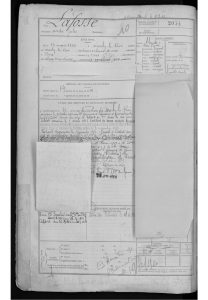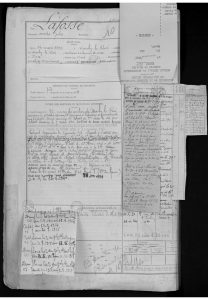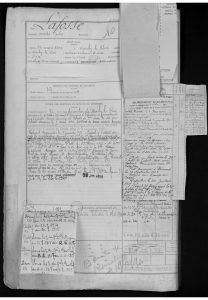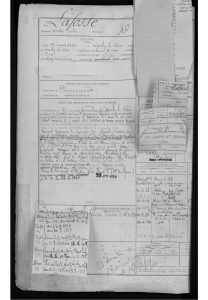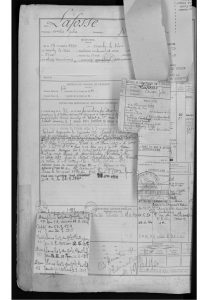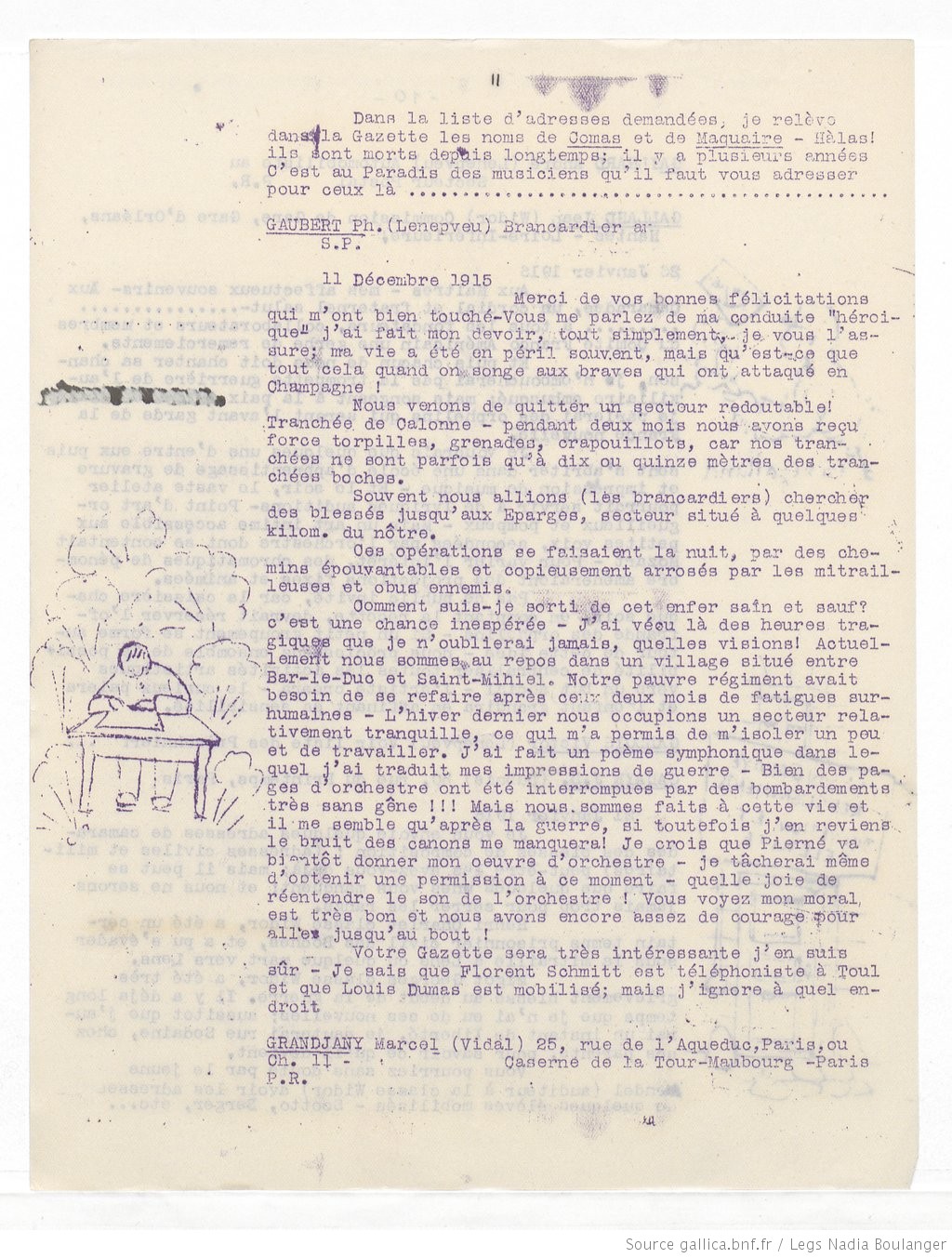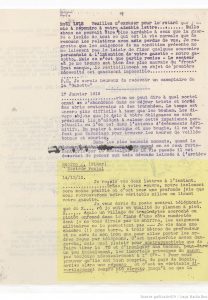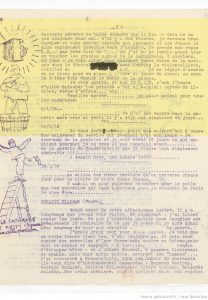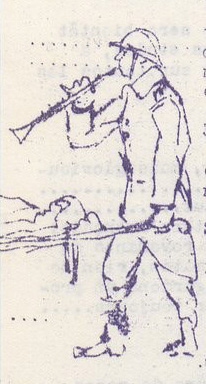Paris-Manchester 1918
Conservatoires in time of war
Life as a stretcher-bearer-musician
The Gazette des classes du Conservatoire is a valuable source of information on the daily life and role of the stretcher-bearer-musician (this being the occupation of many of its contributors). Its first few issues, especially, tell us about the conditions in which they lived.
Like many of his classmates, the trombonist André Lafosse (1890-1975), a future teacher at the Conservatoire, became a musician-stretcher-bearer only after the start of his military service (see his service record). During the war, after spending nearly a year in Kassel as a prisoner of war, he joined a nurses’ unit in October 1915. Such a transfer, common among contributors to the Gazette, can probably be explained by the closeness of the two services and the lack of a hard-and-fast boundary between them.
In the accounts left by these men, one often detects a need to assert the usefulness and courage of the musicians, who were regularly mocked as “shirkers”. In fact, stretcher-bearers were not soldiers, did not carry weapons, and did not go over the top during an attack. However, going to retrieve the wounded between each attack was extremely dangerous (see Philippe Gaubert’s letter): not being classed as medical personnel, stretcher-bearers did not wear armbands with a red cross and were not protected by international conventions. The sketch by Jacques Debat-Ponsan reflects this theme of the heroic stretcher-bearer-musician. The Gazette, published by and for musicians (and a few actors), was in fact a good opportunity to join together around more or less mythical figures like the one depicted here.
Marius Scotto’s letter, for all its humorous tone, contains some valuable information.
Along with the ever-present noise, the constant urgency and the nearness of danger, Scotto, in one sentence, shows the duality experienced by the musicians, who could find themselves both at the front under shell fire and at the rear in generals’ drawing rooms. The officers, often music-lovers and even musicians themselves, were keen to make their daily lives more agreeable by requesting the services of the soldier-musicians, as accounts by Lucien Durosoir and Maurice Maréchal amply confirm.
Service record of André Lafosse
A letter from Philippe Gaubert (11 December 1915)
Translation
Note : les lacunes (indiquées en italique entre crochets) ont été complétées grâce à la lettre autographe conservée à la Bibliothèque nationale de France, département de la musique, Rés Vm Dos 88 (6), folio 2.
GAUBERT Ph. (Lenepveu) stretcher-bearer in the
S.P.[1]
11 December 1915
[My dear classmate]
Thank you for your kind congratulations, which I found very touching. You described my conduct as “heroic”, but all I did was my duty and nothing more, I assure you. I have often been in danger, but that is nothing when one thinks of the brave fellows who went on the offensive in Champagne!
The sector we have just left was terrible![2] On the Calonne Road,[3] our trenches were at times just 30 to 50 feet from those of the Huns, so for two months an awful lot of shells, grenades and mortar rounds came our way.
Often, we (the stretcher-bearers) went as far as Éparges,[4],[5] a sector several miles from our own, to retrieve the wounded.
These missions took place at night, along the most frightening roads under heavy machine-gun fire and shelling from the enemy.
How did I get out of this hell unscathed? I did not think that I would be so lucky – I went through hours of tragedy that I shall never forget. Oh the things I saw! At the moment, we are on a rest break in a village between Bar-le-Duc and Saint-Mihiel. Our poor regiment needed to recover after those two months of superhuman exertion. In the winter we occupied a relatively calm sector, which allowed me to have some time to myself to work. I wrote a symphonic poem conveying my impressions of the war. The enemy had the cheek to interrupt many of the orchestral passages with bombardments!!! But we have grown used to this life, and I have a feeling that after this war, if I do come back from it, I’m going to miss the sound of cannon fire! I believe that Pierné[6] will soon be giving a performance of my orchestral work. I shall try to get some leave for that date – it would be lovely to hear the sound of an orchestra again! As you can see, I am in very good spirits, and we still have the courage to carry on to the end!
I am sure that your gazette will be very interesting. I know Florent Schmitt is a switchboard operator in Toul and Louis Dumas has been called up, but I don’t know where he has been posted
[Very happy to have received your news, my dear friend. Please accept my very best wishes
Ph. Gaubert]
[1]Secteur postal [postal sector].
[2]“:” instead of “!” in the autograph manuscript (Bibliothèque nationale de France, Music Department, Rés Vm Dos 88 [06], folio 72).
[3]Forest road linking Verdun with Hattonchâtel.
[4]A commune in Meuse, site of numerous major battles in 1914 and 1915.
[5]No comma in the autograph manuscript (Bibliothèque nationale de France, Music Department Rés Vm Dos 88 [06], folio 72).
[6]Gabriel Pierné (1863-1937), composer and bandmaster.
[1]Secteur postal.
[2]« : » à la place de « ! » dans le manuscrit autographe (Bibliothèque nationale de France, département de la Musique, Rés Vm Dos 88 [06], folio 72).
[3]Route forestière reliant Verdun à Hattonchâtel.
[4]Commune de la Meuse, lieu de nombreuses batailles décisives en 1914 et 1915.
[5]Pas de virgule dans le manuscrit autographe (Bibliothèque nationale de France, département de la Musique, Rés Vm Dos 88 [06], folio 72).
[6]Gabriel Pierné (1863-1937), compositeur et chef d’orchestre.
Source
Philippe Gaubert (11 December 1915) Letter to the Franco-American Committee, in: Gazette des classes de composition du Conservatoire, No. 2, Paris, February 1916, Bibliothèque nationale de France, Music Department, Rés Vm Dos 88 (1), p. 11 [on line].
Document description: mimeographed document in violet ink, 21×27 cm.
Catalogue : http://catalogue.bnf.fr/ark:/12148/cb43639008g
A letter from Marius Scotto (14 December 1915)
Facsimile
Translation
SCOTTO M. (Widor)
Postal Sector
14/12/15.
I have just received both your letters . . . . . . . . . . . . . . . . . . . Your efforts will make our isolation less burdensome, and, as we read your gazette, we shall have the great pleasure of returning to the lives we were meant to lead.
I am writing to you from the telephone exchange at X. . . . where I am posted as an orderly. X . . . . . is like a village of cave-dwellers hanging on – or rather buried in – the side of a hill (with a number which I’m not allowed to tell you) . I live in an underground chamber (!), about ten feet down, and the only time I leave my hole is to carry the orders that come by telephone. It’s rather dangerous at times, but what fun for a “contrapuntalist” to tell the gunners to fire the 75 and give the Huns what they might find a rather harsh lesson in the time-honoured principles of the “canon” – and not only the musical kind! To show us they have fully understood, an “answer” comes from Hun-land. This is really an “episode” played ever faster until their battery is silenced by our guns – not always without casualties on our side. If there are any wounded, I turn stretcher-bearer, and go to their aid to evacuate them to the rear as speedily as possible. I’m on a rest break at X. . . not very far from V . . . where I was able to go the day before yesterday and touch the great organs in the cathedral (E keyboards, 52 stops). In a few days I am supposed to go play at the General’s residence. . . . . . . . . . . with Hekking,[1] the cellist who was called up at . . . . . . . . . . . . . . . . . . . I’m very much looking forward to this, and can hardly contain myself at the thought of playing the piano; this will be the 3rd time since the start of the war.
I’ll say goodbye – it’s half ten, time to go and peel the spuds. This afternoon there’ll be clearing out the horses’ stalls, uniform inspection etc. etc.
Please accept . . . . . . . . . . . . warmest greetings to all our classmates.
[1]Gérard Hekking (1879-1942), cellist with the Concertgebouw Orchestra from 1903 to 1914.
Source
Marius Scotto (14 December 1915) Letter to the Franco-American Committee, in: Gazette des classes de composition du Conservatoire, No. 2, Paris, February 1916, Bibliothèque nationale de France, Music Department, Rés Vm Dos 88 (1), p. 19-20 [on line].
Document description: mimeographed document in violet ink, 21×27 cm, drawings by Jacques Debat-Ponsan.
Catalogue : http://catalogue.bnf.fr/ark:/12148/cb43639008g
Drawing
Source
Jacques Debat-Ponsan, (1916) [Musician-stretcher-bearer playing the clarinet], in: Gazette des classes de composition du Conservatoire, No. 2, Paris, Bibliothèque nationale de France, Music Department, Rés Vm Dos 88 (1), p. 11 [on line].
Document description: mimeographed document in violet ink, 21×27 cm.


